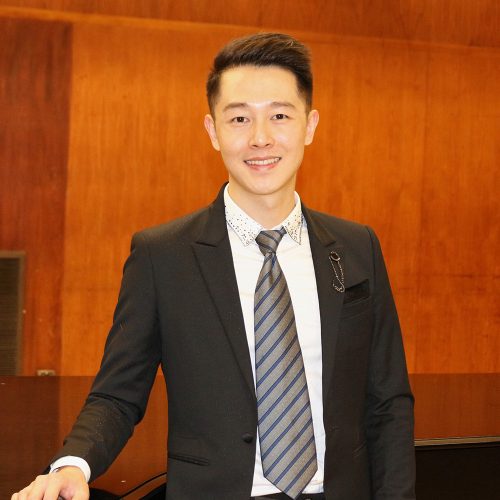
Liangjun Shi
Faculty
Voice
Award-winning Chinese tenor Liangjun Shi is a frequent recitalist and accomplished vocologist. He recorded Chinese art songs for the textbook Bel Canto of China to be published by the People’s Music Publishing House nationwide. He has appeared on stages such as The Great Hall of the People, Peking University Hall, and Fujian Grand Theater, to name a few. In addition, Shi was the winner of the First Prize (preliminary) and the Second Prize (final) in the 24th International Music Competition held by the Music Association of Korea, and the First Prize winner in the 6th Sino-Singapore International Music Competition. His stage roles include Don Quixote/Cervantes in Man of La Mancha directed by Joseph Graves, Priest and Man in Armour in Die Zauberflöte directed by Peer Boysen, Remendado in Carmen, Xuan Wang in The Songs for Xuan Wang, and among others. In addition to his recordings and performances, he is the translator of the Chinese edition of Your Voice: An Inside View 3 by Dr. Scott McCoy.
Shi holds a Doctor of Musical Arts degree in Voice Pedagogy under Professor Carmen Balthrop and Dr. Delores Ziegler at the University of Maryland School of Music. Shi’s dissertation is entitled A Pedagogical Guide to Chinese Art Song: Diction, Style, and a Selected Survey. It proves to be a comprehensive guide for non-native, English-speaking singers and pedagogues to access the treasure of Chinese art song. His research encompasses an innovative phonetic system of Standard Chinese diction to reflect the nuances in the language, a comprehensive survey of traditional Chinese voice pedagogy treatises, the evolution of Chinese poetry, and an insightful analysis of pioneering composers within the Chinese art song genre.
Prior to his doctoral training, Shi received a Master of Arts in Voice Pedagogy, a Master of Music in Voice Performance, and a certificate in Singing Health Specialization from the School of Music, Department of Speech and Hearing Science, and College of Medicine-Department of Otolaryngology at The Ohio State University, under the tutelage of Dr. Scott McCoy. In addition to his interdisciplinary study, he completed a Vocology Certificate from the National Center for Voice and Speech and The University of Utah, under distinguished Dr. Ingo Titze. His previous education has also included a Master of Fine Arts in Drama (Opera) from Peking University under Professor Man Kim, and a Bachelor of Arts in English Language and Literature from the Chengdu University of Technology.
As a Singing Health Specialist and an NCVS-certified Vocologist, Shi has observed Surgical Laryngology and Clinical Speech-Language Pathology at the OSU Wexner Medical Center. Always interested in current research, his recent presentations and appearances have included national and international conferences and forums with topics such as “Sing to your 90s: A Brief Introduction to Singing Health” at the University of Maryland, “Vocal Arts Department Forum” at the University of Southern California, “An Introduction to Chinese Singing Styles” and “Twenty-Seventh Annual Department of Otolaryngology-Head and Neck Surgery Alumni Symposium” at The Ohio State University Wexner Medical Center, as well as the “National Bel Canto of China Forum” in Beijing.
Shi currently serves on the voice faculty at the Peabody Preparatory of the Johns Hopkins University. His students have appeared in leading roles in opera and musical theatre productions, and on professional stages nationwide, such as the San Francisco Gay Men’s Chorus. Many of them have been accepted into competitive programs at the University of Maryland, The Ohio State University, Sichuan Conservatory of Music (China), and Conservatorio di Musica Luigi Cherubini Firenze (Italy). Shi’s research focuses on timbre, vibrato, and health of the singing voice, in cooperation with the Department of Speech, Voice and Language Therapy of the China Rehabilitation Research Center for Hearing and Speech Impairment in Beijing.
Liangjun Shi is a member of the National Association of Teachers of Singing, The Voice Foundation, and the Pan American Vocology Association.